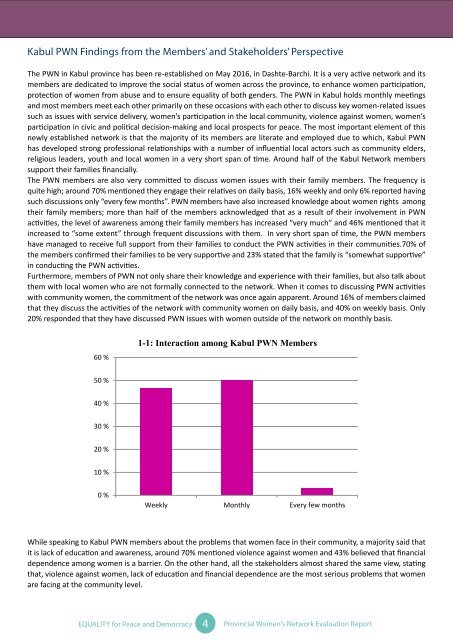Evaluation Report
4HMKrjjbt
4HMKrjjbt
You also want an ePaper? Increase the reach of your titles
YUMPU automatically turns print PDFs into web optimized ePapers that Google loves.
Kabul PWN Findings from the Members’ and Stakeholders’ Perspective<br />
The PWN in Kabul province has been re-established on May 2016, in Dashte-Barchi. It is a very active network and its<br />
members are dedicated to improve the social status of women across the province, to enhance women participation,<br />
protection of women from abuse and to ensure equality of both genders. The PWN in Kabul holds monthly meetings<br />
and most members meet each other primarily on these occasions with each other to discuss key women-related issues<br />
such as issues with service delivery, women’s participation in the local community, violence against women, women’s<br />
participation in civic and political decision-making and local prospects for peace. The most important element of this<br />
newly established network is that the majority of its members are literate and employed due to which, Kabul PWN<br />
has developed strong professional relationships with a number of influential local actors such as community elders,<br />
religious leaders, youth and local women in a very short span of time. Around half of the Kabul Network members<br />
support their families financially.<br />
The PWN members are also very committed to discuss women issues with their family members. The frequency is<br />
quite high; around 70% mentioned they engage their relatives on daily basis, 16% weekly and only 6% reported having<br />
such discussions only “every few months”. PWN members have also increased knowledge about women rights among<br />
their family members; more than half of the members acknowledged that as a result of their involvement in PWN<br />
activities, the level of awareness among their family members has increased “very much” and 46% mentioned that it<br />
increased to “some extent” through frequent discussions with them. In very short span of time, the PWN members<br />
have managed to receive full support from their families to conduct the PWN activities in their communities.70% of<br />
the members confirmed their families to be very supportive and 23% stated that the family is “somewhat supportive”<br />
in conducting the PWN activities.<br />
Furthermore, members of PWN not only share their knowledge and experience with their families, but also talk about<br />
them with local women who are not formally connected to the network. When it comes to discussing PWN activities<br />
with community women, the commitment of the network was once again apparent. Around 16% of members claimed<br />
that they discuss the activities of the network with community women on daily basis, and 40% on weekly basis. Only<br />
20% responded that they have discussed PWN issues with women outside of the network on monthly basis.<br />
60 %<br />
1-1: Interaction among Kabul PWN Members<br />
50 %<br />
40 %<br />
30 %<br />
20 %<br />
10 %<br />
0 %<br />
Weekly Monthly Every few months<br />
While speaking to Kabul PWN members about the problems that women face in their community, a majority said that<br />
it is lack of education and awareness, around 70% mentioned violence against women and 43% believed that financial<br />
dependence among women is a barrier. On the other hand, all the stakeholders almost shared the same view, stating<br />
that, violence against women, lack of education and financial dependence are the most serious problems that women<br />
are facing at the community level.<br />
EQUALITY for Peace and Democracy<br />
4<br />
Provincial Women's Network <strong>Evaluation</strong> <strong>Report</strong>


